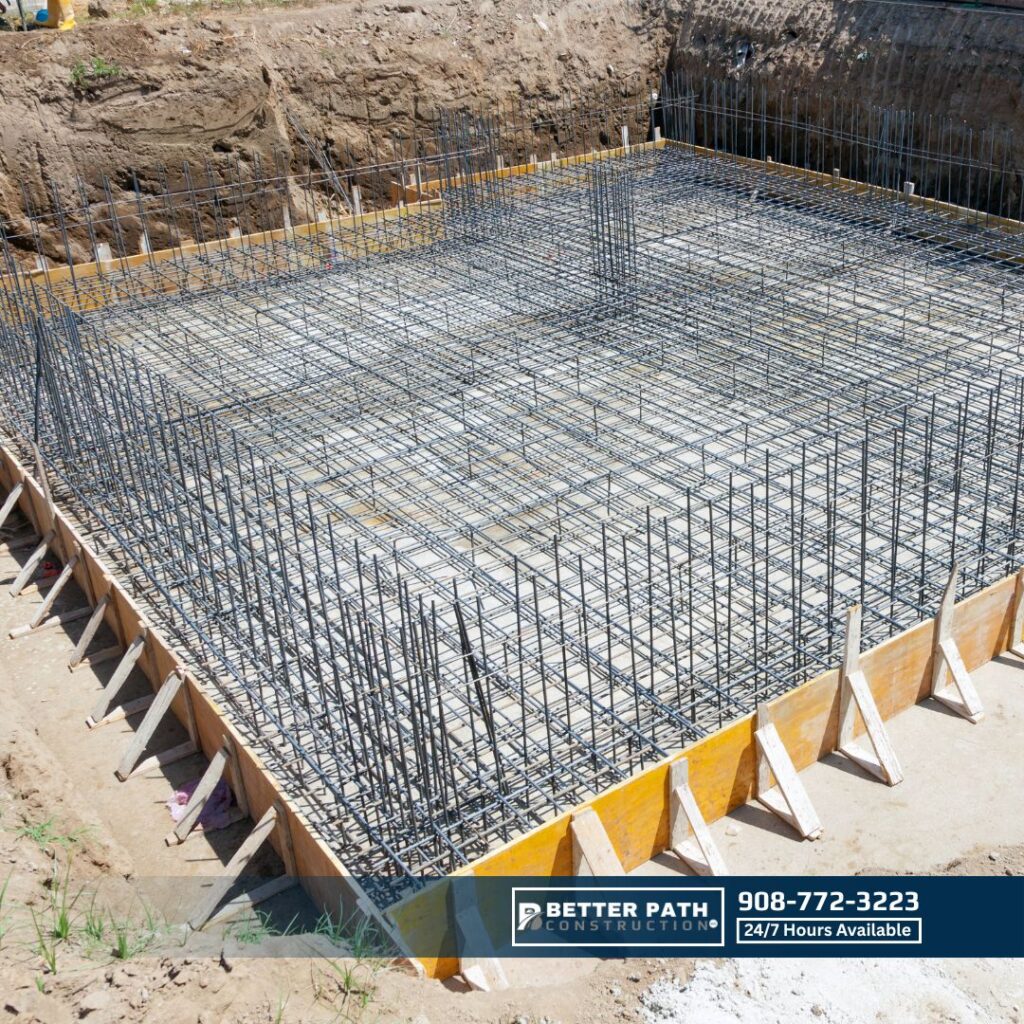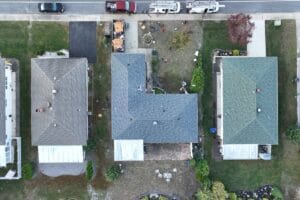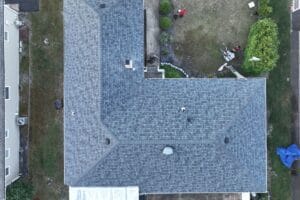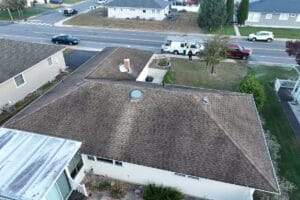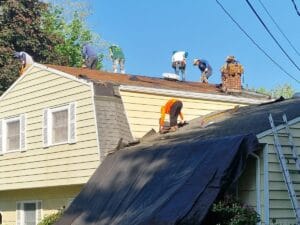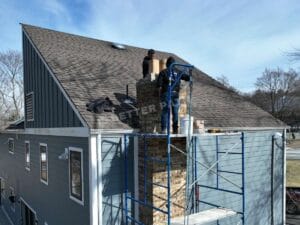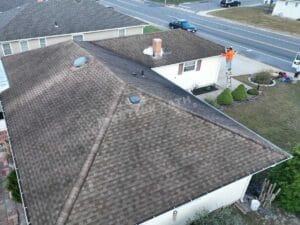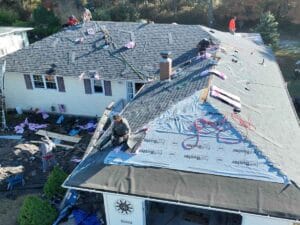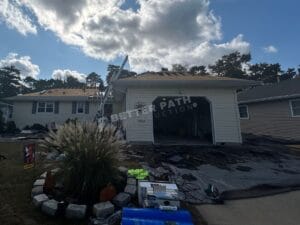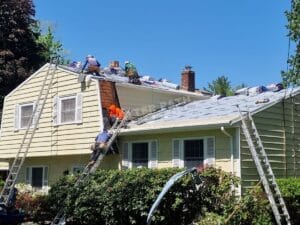A well-constructed concrete shed foundation is the cornerstone of a durable outdoor storage solution. At Better Path Construction LLC, we’ve been crafting high-quality shed bases for homeowners in Little Falls, NJ, and neighborhoods like Singac, Great Notch, Cedar Grove, and Montclair for over 15 years. For example, our expertise ensures your shed withstands New Jersey’s harsh weather and clay-heavy soils. This comprehensive guide shares insights on shed construction, common repair challenges in Little Falls, safety tips, FAQs, and why locals trust us for their outdoor storage foundation projects. Additionally, we’ll cover practical steps, local project examples, and tips to help you plan your concrete shed foundation.
Why Choose a Concrete Shed Foundation?
A concrete shed foundation offers more stability than gravel, wooden skids, or paver bases. For instance, it resists soil shifting, supports heavy loads, and endures Little Falls’ freeze-thaw cycles, making it ideal for garden sheds or workshops. Therefore, a cement footing ensures your shed stays level and secure, protecting your investment.
Our team tailors base preparation to New Jersey’s clay soils. For example, in a Singac project on Browertown Road, we built a 10×12 concrete pad for a garden shed. By excavating, compacting soil, and adding rebar for a reinforced foundation, we delivered a durable shed base that’s crack-free two years later. Similarly, we constructed an 8×10 concrete slab for a tool shed in Great Notch, ensuring stability on a sloped lot. These projects show why a concrete shed foundation is the best foundation for a garden shed. Moreover, concrete is low-maintenance, unlike gravel, which shifts, or wood, which rots. However, proper installation is key to avoiding repairs, as we’ll explore next.
Common Concrete Shed Foundation Issues in Little Falls, NJ
Little Falls’ climate and soil pose challenges for shed construction. Consequently, understanding these issues helps homeowners plan a durable shed base. Here are common problems we address:
Freeze-Thaw Cracks in Concrete Slabs
New Jersey winters cause water to seep into concrete slabs, freezing and forming cracks. For example, in Great Notch, we repaired a cracked shed base on Notch Road with epoxy injections and a waterproof sealant, costing $800. This restored the foundation’s strength.
Soil Shifting Under Shed Bases
Clay soils near the Passaic River shift, causing uneven surfaces. As a result, in Cedar Grove, we leveled a sinking outdoor storage foundation for a 12×16 shed by lifting the slab and adding a compacted gravel base, costing $1,200. This ensured long-term stability.
Drainage Problems for Concrete Pads
Without proper base preparation, water pools under the slab, causing erosion. For instance, in Montclair Heights, we fixed a water-damaged concrete pad with a drainage swale and sealant for $1,500, redirecting water effectively.
Inadequate Concrete Slab Thickness
Some DIY foundations use slabs thinner than 4–6 inches. In a Clifton project, we replaced a 3-inch slab that cracked under a workshop shed, pouring a new 6-inch concrete shed foundation for $2,800. These challenges highlight the need for experienced contractors. Therefore, we use high-strength concrete and proper concrete curing for lasting results.
How to Build a Concrete Shed Foundation
Building a reliable concrete shed foundation requires precision. For example, our process at Better Path Construction LLC is refined through projects in Little Falls and nearby areas.
Site Assessment for Shed Bases
First, we assess soil type, slope, and drainage. For instance, in a sloped yard in The Village at Little Falls, we excavated 6 inches of soil and leveled the ground to create a stable shed base. Proper base preparation prevents settling.
Formwork and Reinforced Foundations
Next, we build pressure-treated lumber forms and add rebar or wire mesh for a reinforced foundation. In a Clifton project, for example, we poured a 12×16 concrete slab for a workshop, using rebar to support heavy machinery. This enhances durability.
Foundation Pour and Concrete Curing
Then, we pour a 4,000 PSI concrete mix, typically 4 inches thick for standard sheds or 6 inches for heavier structures. Concrete curing takes 7–28 days for maximum strength. For example, in a Wayne project, we monitored curing to prevent cracks in humid conditions.
Finishing and Sealing Concrete Pads
Finally, we smooth the surface and apply a waterproof sealant to protect against moisture, especially near the Passaic River. In a Montclair project, this extended the life of a concrete base for an outdoor shed. However, for a DIY concrete shed base, we caution against uneven pours or weak cement footings, which lead to costly fixes. Instead, our team ensures compliance with Little Falls codes and handles permits for over 100 square feet sheds.
Safety Tips for Concrete Shed Foundations
Safety is critical for a concrete shed foundation. Therefore, here are our recommendations:
- Inspect Annually: First, check for cracks or settling post-winter. For example, we offer free inspections in Little Falls to catch issues early.
- Ensure Proper Drainage: Additionally, slope the ground away from the concrete slab to avoid pooling. In a Totowa project, we added a gravel perimeter for drainage.
- Use Protective Gear: Meanwhile, wear gloves, safety glasses, and boots for concrete work. For repairs, trust our licensed team.
- Match Load to Thickness: Finally, ensure the concrete slab thickness for the shed (4–6 inches) suits the shed’s weight. These tips maintain a durable shed base.
Cost of a Concrete Shed Foundation in Little Falls, NJ
The cost of a concrete shed foundation varies by size, thickness, and site conditions. For example, a 10×12 concrete shed foundation in Little Falls costs $1,000–$3,500. Larger projects, like a 16×20 shed base for a workshop, range from $4,000–$6,000, especially with extensive base preparation or drainage solutions.
For instance, in Cedar Grove, we poured a 10×10 concrete pad for a garden shed for $2,200, including rebar and sealing. Conversely, a Wayne project with poor soil required extra excavation, costing $3,800 for a 12×16 slab. We provide free quotes for transparency.
Comparing Shed Foundation Materials
While a concrete shed foundation is our top choice, other options exist:
Gravel Shed Bases
Gravel is affordable for small, prefab sheds, but it may shift. In Montclair Heights, we upgraded a gravel base to a concrete slab for a 10×12 shed for stability.
Wooden Skid Foundations
Wooden skids suit temporary sheds, but rot in Little Falls’ wet climate. For example, we replaced a rotted wooden base in Singac with a cement footing for $2,500.
Paver Base Options
Paver bases are aesthetically pleasing but less durable for heavy sheds. Therefore, concrete is the best foundation for a garden shed.
Why Little Falls Chooses Better Path Construction LLC
Homeowners in Little Falls, Clifton, Wayne, and Montclair trust us for shed foundation ideas due to our expertise.
Expertise in Concrete Shed Foundations
First, we understand Little Falls’ clay soils and freeze-thaw challenges. Additionally, we use 4,000 PSI concrete for durable shed bases.
Trusted Local Reputation
Moreover, our 5-star Yelp and Angi reviews reflect our transparency. For instance, a Singac client praised our concrete base for an outdoor shed as “flawless and affordable.”
Proven Concrete Foundation Results
For example, we built a 10×10 concrete shed foundation for $2,200 in Montclair with non-slip finishes. We guided a DIY concrete shed base consultation in Cedar Grove, saving costs. In Wayne, we completed a 14×20 foundation pour with drainage solutions.
Maintaining Your Concrete Shed Foundation
Regular maintenance extends your shed base’s lifespan. For example:
- Seal Every 2–3 Years: Reapply sealant to protect against moisture.
- Clear Debris: Remove leaves to prevent pooling.
- Monitor Cracks: Fix small cracks with epoxy.
- Check Drainage: Ensure water flows away.
In a Totowa project, we resealed a concrete pad and added a gravel border for $400.
FAQs About Concrete Shed Foundations
Costs range from $1,000–$3,500 for a 10×12 concrete shed foundation. Contact us for a free quote.
A concrete shed foundation is ideal, while gravel suits smaller sheds.
A 4-inch slab is standard; 6 inches for heavy loads.
Yes, repairs cost $500–$2,000 using epoxy.
Sheds over 100 square feet require permits. We handle applications.
Concrete curing takes 7–28 days.
Concrete is most durable, followed by gravel and pavers.
Contact Us for Your Concrete Shed Foundation
Ready to build a concrete shed foundation in Little Falls, NJ? Better Path Construction LLC is your trusted partner for outdoor storage foundation projects. Call (908) 772-3223 or visit www.betterpathconstruction.com for a free quote. Let’s create a durable shed base in Singac, Great Notch, or beyond!

